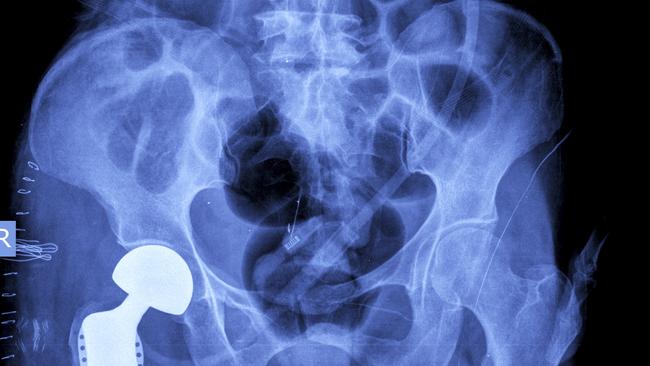Health insurers call for prostheses tender
Health insurers are calling for the Morrison government to step away from pricing replacement hips, knees and other artificial body parts.

Health insurers are calling for the Morrison government to step away from pricing replacement hips, knees and other artificial body parts, to stop alleged price-gouging in Australia’s private healthcare system.
NIB managing director Mark Fitzgibbon said the industry was mature enough to negotiate directly with medical device companies, while his counterpart at Bupa, Dwayne Crombie, called for an open tender process, similar to the public hospital system.
The call comes as health insurers say they have received less than 10 per cent of the promised $250m savings from Health Minister Greg Hunt’s cuts to the prostheses list in 2017.
Health insurers say medical device companies have been “gaming” the system by adding ancillary items such as sponges and skin glues that have blown out the cost of prostheses, which cost the industry about $2bn a year.
“I think the medical device industry has gamed the whole system really,” Mr Crombie told The Australian.
“You don’t expect sponge and glue and other little things to be devices, so I think they’ve been cute. They certainly didn’t honour the spirit of the agreement.”
Mr Crombie said patients in the private sector were already paying more for prostheses than in the public sector and overseas.
“There is plenty of evidence they’re more expensive. Stents, for example — we pay five times the cost of some of those stents compared with New Zealand because they have a proper procurement process.
“Even in some of the public hospitals in Australia, they have a tendering process. They are forced through a competitive process to get a better price. That’s what we are missing in Australia in the private system.”
Mr Fitzgibbon said NIB’s prostheses bill soared 10 per cent in 2019, which was “not acceptable”.
He called for change in incentives. “Show me a bad incentive and I’ll show you a bad outcome. This world in which we pay doctors, medical device companies and hospitals based on volume is creating a natural incentive for more volumes — that’s self-evident,” Mr Fitzgibbon said.
“Other parts of the world are addressing that through … arrangements where doctors are paid upon outcomes not based upon on whether they used a knife or prosthetic device or whatever the case may be. It’s harder to do but it’s the way we have to go.”
Medibank chief executive Craig Drummond last week called for further reform, saying the prosthesis units being fitted in private hospitals were poorer quality and more expensive than those used in the public system.
For example, a replacement hip in a private hospital costs $3000 more on average, at $9626, compared with $6299 in the public system, according to the Independent Hospital Pricing Authority.
“We think the savings here are in the many tens of millions — it’s not a couple of thousand,” Mr Drummond said.
“We know the quality of devices that are being used in the private system, particularly in areas like hip joints, are poorer with a higher revision rate than those used in the public system. And the ones used in the private system are more expensive.”
But Australian Orthopaedic Association (AOA) president Andrew Ellis said there were many factors contribution to the cost difference and revision rate in private hospitals.
“There are differences in the patient populations treated in public and private hospitals that need to be addressed,” Dr Ellis said.
“Public patients tend to be older and more frail. Therefore, the type of prostheses selected and used varies on this basis. As an example, there is increased use of cemented stems to deal with issues of poor bone quality, and these are cheaper.
“Even though the same device performs similarly when used in private and public systems, the patient population overall is different.”
Craig McNally, the chief executive of Australia’s biggest private hospital operator Ramsay Health Care, said it was ”absolutely absurd to think doctors and hospitals were being upsold to put more things in patients”.
“There is no question that there has been an increase in prostheses cost. But the biggest impact on prostheses has been higher spec items, such as those used in cardiac procedures, onto the list,” Mr McNally said. “There has been a significant take-up, when previously the health funds have been accused of not properly funding these procedures which have been mainly done in public hospitals with some exceptions in the private sector.”
Mr McNally said advancements in medical technology, designed to save lives, should be included on funding schedules.




To join the conversation, please log in. Don't have an account? Register
Join the conversation, you are commenting as Logout